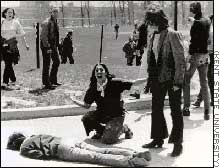Memorial Day is meant as a day to remember the soldiers who died in our nation's various wars. That roster has grown longer in the last few years, and we should remember and honor their sacrifice...
I've never understood this use of the term "sacrifice." Sacrifice means
- offering something to a deity...
- forfeiture of something highly valued for the sake of [something of] greater value
- relinquishment of something at less than its presumed value
On Monday NPR's Talk of the Nation spoke about military deaths in the voices of the families of dead soldiers and the men who brought the news of the deaths to the families. Newshour with Jim Lehrer featured Wyatt Prunty's poem, "The Returning Dead" honoring the pictures or the soldiers whose pictures Newshour shows every night.
Thoughts from Kansas goes on to say:
I think it should also be a day to remember the people who have died in the fight against war.And he posted this picture. I think few young people will recognize the picture. Yet, in some ways this was the event that changed our world. It brought us the fear that American troops could, and would, kill American citizens.
This is also a time to remember people whose lives have been changed by experiences related to wars. I'm pretty sure that's all of us.
I imagine not many people under the age of fifty recognize the picture of the Kent State students. For a surreal description see the Kent State Library's collection which gives new meaning to the term "Riot Act." I wonder what will have happened by 2040 to displace the pictures in our minds of the falling buildings in New York in 2001.


3 comments:
I don't think #2 and #3 are contradictory.
#2 Forfeiting ones life (highly valued) for the sake of (insert ridiculous reasons for war here - of higher value than one's life) I think not.
#3 Relinquishing something (one's life) at less than its *presumed* value. Do governments value the lives of people they send to war? Do they *presume* those lives are worth less than their cause?
I recognize the Kent State picture, but understand too little of that time in this country's history. Heck, I don't understand much about this time in history.
I recognized the Kent State pictures, coincidentally I was listening to Ohio (CSN&Y) this morning before I read you post.
Oh, Mary Ann, I recognized that picture right away, and I'm just 35. Not all of us post-boomers are choosing to ignore history.
Post a Comment